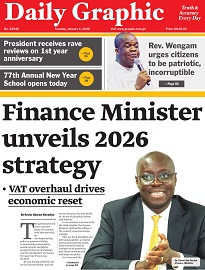
Honouring coupons good for investor confidence — Economists
The government's latest payment of GH¢9.541 billion to Domestic Debt Exchange Programme (DDEP) bondholders can help restore investor confidence in the local bond market and the country’s financial markets, two economists have said.
A Professor of Finance, Godfred Bokpin, and Dr Said Boakye have argued that the consistent payment pattern, coupled with the goodwill being enjoyed by the current government, could help revive the local bond market, which had been dormant since the DDEP.
Context
As part of measures to restore debt sustainability, the government launched the DDEP in 2022 to restructure its domestic debt.
The DDEP saw the government swap old bonds for new bonds worth GH¢82 billion at reduced coupon rates and longer tenors.
Since then, the government has made four coupon payments to the investors who lost significant money from the exercise.
The first payment in August 2023 totalled GH¢8.55 billion (GH¢5.42 billion PIC and GH¢3.13 billion PIK), followed by February 2024 with a payment of GH¢9.11 billion (GH¢5.85 billion PIC and GH¢3.27 billion PIK), and August 2024’s disbursement of GH¢9.35 billion (GH¢5.98 billion PIC and GHS3.38 billion PIK).
Last Monday, the President directed the Finance Minister to complete the fourth round of payments under the DDEP.
The latest disbursement of GH¢9.541 billion in total is comprised of GH¢6.081 billion PIC and GH¢3.46 billion PIK.
Sinking Fund
Looking ahead, the government has set aside GH¢9.7 billion in the Debt Service Recovery Cedi Account (Sinking Fund) to cover the upcoming fifth DDEP coupon payments due in July and August 2025.
The economists stated that the reliability, coupled with the administration's proactive measure of setting aside GH¢9.7 billion as a buffer for future payments, could help rebuild trust in Ghana's economy and potentially attract new investments.
President Mahama's administration has expressed the commitment to roll out additional measures in the 2025 Budget Statement to restore market confidence, prioritise spending and enhance transparency in public finances.
Consolidate gains
Prof. Bokpin, who is an economist and lecturer at the University of Ghana Business School, said the recent payment would help consolidate gains that had been made in obtaining market confidence.
“We have seen some goodwill being restored. In the run-up to the election, especially in the month of November, government was struggling to meet each of its treasury bill targets, but right after the election, with a change in government, you can see that there's a considerable uptick, even leading to oversubscription,” he said.
The professor of finance, who predicted the haircut before it was rolled out, said such confidence would impact the local bond market soon, adding that the government’s latest payment would send a signal to the market that it was committed to the terms agreed.
“The signal, especially as the government is looking beyond just a fourth payment, a fifth payment and all of that,” he said.
Sinking fund
Prof. Bokpin said it was, however, important to note that while it was good to put in place a Sinking Fund for the repayments, it had its own opportunity cost.
He said monies meant for the fund could have been invested in other development projects.
“But of course, under the circumstance, we need to consolidate the confidence, so it’s good we put it in the Sinking Fund for repayments,” he added.
With the international capital market expected to be closed to the country for a long time, Prof. Bokpin said it was important to reopen the domestic bond market.
That would help the government to access medium to long-term capital for development financing, he added.
Don’t rush
On the contrary, Dr Boakye, who is the Executive Director of the Institute of Fiscal Studies, advised the government not to make a return to the local bond market its immediate priority.
He said while the bond market presented a better option than the current Treasury Bills (T-bills), the government must look more at raising enough revenues to finance its budget.
“The government must limit its dependence on loans to fund its budget. We have to expand revenue to fund the budget,” Dr Boakye said.
He said the continuous repayments were very good to help rebuild the country’s credibility.
“So even though it will help restore confidence, the government should be very careful with going quickly back into the markets to borrow,” the Executive Director of IFS said.

